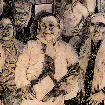
Nobody Gets Off the Bus:
The Viet Nam Generation Big Book
Volume 5 Number 1-4
March 1994
This text, made available by the Sixties Project, is copyright (c) 1996 by Viet Nam Generation, Inc., or the author, all rights reserved. This text may be used, printed, and archived in accordance with the Fair Use provisions of U.S. Copyright law. This text may not be archived, printed, or redistributed in any form for a fee, without the consent of the copyright holder. This notice must accompany any redistribution of the text. The Sixties Project, sponsored by Viet Nam Generation Inc. and the Institute of Advanced Technology in the Humanities at the University of Virginia at Charlottesville, is a collective of humanities scholars working together on the Internet to use electronic resources to provide routes of collaboration and make available primary and secondary sources for researchers, students, teachers, writers and librarians interested in the 1960s.
Publisher's Statement
Welcome to the Viet Nam Generation Big Book. Dan and I didn't set out to put a Big Book together. We'd planned to publish our usual combination of single and double-issues on our regular (irregular) 1993 schedule, but a series of small and large domestic emergencies halted production for over a year. We were able to continue collecting manuscripts, but we fell far behind in correspondence and fulfillment. My move from Maryland to Connecticut in August forced me to close up the print shop while we moved the computers and peripherals which I use to prepare VG's camera-ready copy. It took several months to set up a new office with Dan. By the time we were ready to begin production work again, we had a backlog of excellent manuscripts large enough to make us rethink our publication plans. We realized that what we had was an unparalleled collection of material about the 1960s and the Viet Nam war, and that we had an opportunity to publish a remarkable book--one that would, we thought, become a standard text for those interested in teaching that decade and that war.
The more we thought about it, the more we felt that we needed to present these essays and works of fiction and art in a format that would have lasting value for scholars in the field. So the idea of the Big Book was born-- an anthology of scholarly and critical essays, narrative, poetry and graphics which would represent what Dan and I think of as the forgotten Sixties, the real mainstream. In the Big Book, therefore, you will find a lot of writing by REMFs of all types-- Viet Nam veteran REMFs, era REMFs, counterculture REMFs and antiwar movement REMFs. You will also find essays on subjects as varied as the environmental movement, the New Right, Vo Nguyen Giap, and the Grateful Dead. You can't fit the 1960s or the Viet Nam war between two covers. We wanted to compile a volume so rich and complicated that it left no doubt that there was an iceberg underneath this tip....
Because we wanted to create a volume which would could be used as a textbook, we have altered our format slightly. The "Announcements, Notices & Reports" section contains no dated material, but instead serves as a snapshot of the field in 1993. We also made the book visually interesting and aesthetically pleasing, incorporating many graphic elements into the text.
Graphic Art
The reproduced engravings scattered throughout this volume were shamelessly borrowed from La Guerre Illustrée, a French language magazine published in Paris in the late Nineteenth century. Dan found the two-volume set, "Chine--Tonkin--Annam," in the Yale University library. It was filled with beautiful illustrations, some of them remarkable for their documentary quality, others marked by the racism of the artist. The introduction to La Guerre Illustrée states:
Ce livre n'est nì une critique, ni une apologie. C'est le récit, fait sous une forme popularie, c'est-à- dire claire et précise, des prodiges accomplis dans L'Extrême Orient par nos braves soldats et nos glorieux marins.C'est un hommage sincère rendu à la valeur de cette poigné de Français qui se battent au loin pour la Patrie et qui déploient audacieusement notre drapeau à l'autre bout du monde.
The text, written by Lucien Huard, was not exciting-- at least I did not find it so. But the graphics are something else.
In jarring contrast to the complex and detailed Nineteenth century artworks are the freehand cartoons of the Sixties underground press artists whose graphics also decorate this volume. These graphics were scanned from copies of Black Panther newspapers printed between 1968 and 1972. If you have not spent a lot of time perusing back issues of these journals, you might give them a look. The radical rhetoric and revolutionary ideology of many Sixties underground press publications is astonishing and sobering when compared to the pap which today passes for "oppositional" literature. "Cop Killer" rap lyrics have nothing on Fire's "Bacon for Breakfast" front cover (not reproduced in this anthology because we couldn't afford the black-on-red printing which gives the graphic its impact)--a pig wearing a badge, roasting over flames.
I have made no attempt to caption these borrowed illustrations-- I leave it to you to sort them out and urge you to plumb the riches of the original sources. If you would like any more information about our graphics, contact me at Viet Nam Generation, Inc. We hope that there are scholars interested in giving this material the careful treatment it deserves.

